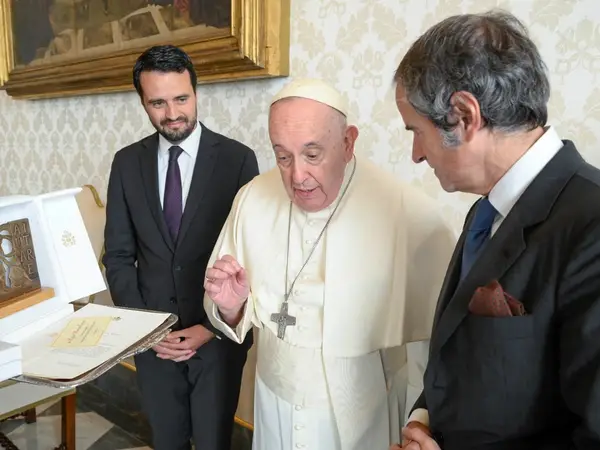This week’s meeting between United Nations atomic chief Rafael Mariano Grossi and the pontiff focused on Ukraine but took in the stalled Iran nuclear talks.
Speaking to Catholic media following his discussion Thursday, Grossi, director-general of the UN’s International Atomic Energy Agency (IAEA), said the support of Pope Francis and the Holy See was “fundamental” in finding multilateral solutions to international crises. He welcomed the Holy Father’s emphasis on the seriousness of the nuclear threat, and said he sought “spiritual guidance” not just as a Catholic.
The IAEA chief said he would continue efforts to secure the “sanctuary-ization” of Ukraine’s Zaporizhzhia nuclear power plant, Europe’s largest, where the IAEA has sent four staff. Zaporizhzhia has been under Russian control since March and is subject to periodic shelling. The director-general said he would visit Ukraine the week of January 16 and hoped also to visit Moscow.
Following the pope’s expressed concern January 9 over the lapsed 2015 Iranian nuclear agreement, the JCPOA (Joint Comprehensive Plan of Action), at a gathering of ambassadors at Vatican, Grossi acknowledged there was an “impasse” with international negotiations “broken down” over “a volatile and dangerous issue.”
Vatican media had reported that Francis told the ambassadors that he hoped a “concrete solution can be reached as quickly as possible [to restore the JCPOA], for the sake of ensuring a more secure future.”
Iran’s continued expansion of its nuclear program in the absence of a revived JCPOA, Grossi said, constituted “steps towards proliferation.” The director-general said he hoped to go to Tehran “as soon as possible” to resume the agency’s own negotiations with Iran centered on unexplained uranium traces found in sites related to Iranian work carried out before 2003. “I am ready to travel and start again,” Grossi stressed.
‘Fear and anguish’
In response to a question on the pope’s often expressed view that the possession of nuclear weapons was immoral and that a global nuclear threat provoked “fear and anguish,” Grossi stressed the potential of the “exclusively peaceful use of nuclear power” to “provide a clean, carbon-free solution for the global economy.” But he agreed with the head of the Catholic church that “nuclear weapons do not provide security: it is the opposite.”
In Tehran, the hardliner Mehr news highlighted Grossi saying - in his interviews with Vatican media - that no progress had been made in the agency’s bilateral talks with Iran. Mehr repeated accusations by the Islamic Republic that the IAEA had in “past years…repeated some of the claims made by the Israeli regime against Iran’s nuclear program” and insisted Iran had given “detailed answers” to the agency’s questions.
The United States and its leading European allies agree with the IAEA that Iran has not provided satisfying answers to IAEA questions and demand Tehran to resolve the issue.
IAEA inspectors discovered the uranium traces after allegations made 2018 by Benjamin Netanyahu as Israeli prime minister encouraged then United States President Donald Trump’s to leave the JCPOA and slap ‘maximum pressure’ sanctions on Iran.Netanyahu has just returned as prime minister with what Haaretz military correspondent Amos Harel called “an aggressive line on Iran.”
